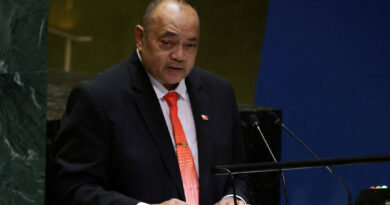Quad Officials and Experts Still Worried About China
China was a main focus at the group’s recent meeting amid continued tensions in the South China Sea, experts said. Although China was not explicitly mentioned, experts agree that it was the central focus of discussions at the Quad nations’ meeting in Tokyo on July 29.
Philippine president Ferdinand Marcos Jr. recently accused China of “unjustified, illegal and reckless” behavior after Chinese planes flew dangerously close to a Philippine air force plane. This encounter heightened concerns expressed by the Quad nations—the United States, Japan, Australia, and India—regarding coercive and intimidating maneuvers in the South China Sea.
The meeting of the Quad nations held in Tokyo focused largely on China, according to experts who spoke with The Epoch Times. The group’s objective is to contest Chinese domination in the Indo-Pacific region.
Grant Newsham, a retired U.S. Marine colonel, emphasized the group’s commitment to contesting Chinese dominance, even if not directly mentioning China. He highlighted the significance of the meeting in expressing unity and commitment to this objective.
In a joint statement released after the meeting, the Quad nations reaffirmed their commitment to a free and open Indo-Pacific and upholding the rules-based international order.
Newsham pointed out that the Quad’s aim of promoting a free and open Indo-Pacific aligns with protecting the interests of major democracies in countering China’s domination. The joint statement also raised concerns about intimidating maneuvers and the weaponization of coast guard vessels in the region.
The Quad nations expressed support for effective regional institutions and the unity of ASEAN. However, differences within ASEAN pose challenges in responding to China’s actions in the South China Sea. Unity within ASEAN is crucial for effectively addressing geopolitical challenges arising from China’s revisionist tendencies.
Weaponization of Coast Guard Vessels
Concerns about the militarization of coast guard vessels, maritime safety, and China’s activities in the South China Sea were highlighted in the joint statement. The weaponization of coast guards and militia vessels in the Indo-Pacific region demonstrates China’s grey-zone tactics to create conflicts.
State of Affairs at ASEAN
The Quad statement emphasized the importance of ASEAN’s centrality and unity in addressing regional challenges. ASEAN’s consensus-based decision-making process can impede strong action against China’s assertiveness without unified support.
ASEAN’s divisions and varying positions on territorial disputes, particularly in the South China Sea, complicate regional responses to China’s actions. The lack of a unified stance within ASEAN threatens the Quad’s ability to address Chinese assertiveness effectively.
A ‘Game in Peacetime’
The Quad’s concerns about China and efforts to strengthen security in the region are crucial for maintaining peace and stability in the Indo-Pacific. The Quad’s focus on addressing maritime safety, humanitarian assistance, and disaster relief underscores the group’s commitment to regional security.
While the Quad advocates for peaceful resolution of maritime disputes, continued militarization in the South China Sea poses risks of conflict escalation. China’s construction of artificial islands and military deployments increase tensions in the region, highlighting the need for diplomatic efforts to prevent conflict.



